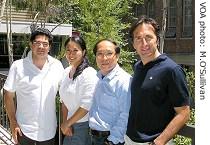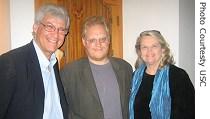2007年VOA标准英语-Mid-Career Officials Learn to Listen, Advocate(在线收听)
Los Angeles
05 July 2007
In this information age, governments are reaching out to people in other parts of the world in an emerging field called public diplomacy. Mike O'Sullivan reports, mid-career officials from government and international institutions recently came to Los Angeles to sharpen their skills in the field.
Public diplomacy involves some very different methods of outreach. Joe Wang, senior consul at the Taipei Economic and Cultural Office in Los Angeles, is one of 15 mid-career professionals who took part in a two-week program at the University of Southern California Center on Public Diplomacy. He says that winning hearts and minds is part of public diplomacy, and he quotes a saying by the Chinese philosopher Sun Tzu, author of the classic "Art of War."

(From left) Jose Manuel Bassat, Soung-ah Choi, Joe Wang, Leonardo Mazzei 05 July 2007
"It means 'It is better to win people's hearts than to conquer their cities.' So from there, we can understand the major concept of promoting public diplomacy in a host country is to engage in direct dialogue," Wang said.
Wang says his work as a diplomat involves showing photo exhibits of Taiwan's scenic attractions, giving speeches to civic groups, and organizing academic and cultural exchanges.
University of Southern California professor Nicholas Cull says public diplomacy can entail advocating policies, but often it does not.
"It doesn't have to be about advocacy. It doesn't have to be about telling people things," he said. "An important part of public diplomacy is listening to other nations, and, in fact, I would say that is where your public diplomacy should begin, with proper listening."
Communications analyst Eytan Gilboa teaches at Israel's Bar-Ilan University and at USC. He says public diplomacy may involve promoting a national image, or creating open forums for the sharing of ideas, a process facilitated by new technologies.
"For example, the Internet provides ample opportunities for creating dialogues with peoples around the world. We call it cyber-public diplomacy," Gilboa said.
Leonardo Mazzei, a communications officer for the World Bank, says the new cyber-technologies have helped the outreach of institutions like his, but he says the new technology has its limits.
"I think it's very good to keep in mind that new technologies are still in the world a privilege to a few, and not to many," Mazzei said. "And I think it's good to keep that in mind when we put in perspective the IT [information technology] boom, if you will, and make sure that it's not only about the technology. It is also about the humans that are interacting with the technology."
International broadcasting is an established means of outreach by national governments, and many have added television and Internet components to their older radio services. Soung-ah Choi, associate spokesperson for the United Nations secretary-general, says radio remains an important medium, even in this multimedia age. She says that long-distance shortwave broadcasts are especially important in the developing world.
"At the United Nations we deal with every country in the world," Choi said. "And in this, shortwave is very important because we know that a quarter of the world does not get anything else but shortwave radio. And it is essential for those people in these regions to have that source of information. And that is one of the reasons that the U.N. itself has a radio."
The United Nations broadcasts in regional languages in Africa, Latin America and South Asia.
 |
| (From left) Geoffrey Cowan, Nicholas Cull, Public Diplomacy program participant Aileen Adams 05 July 2007 |
He says public diplomacy explains a government's positions, but does not always make them popular.
"What we're learning about, I hope, in this public diplomacy program, is not to spin a country so that it's popular, but to understand all the elements of it," Cowan said. "And where the accurate representation is not a good one, to then go back to the people in those countries and say, maybe our country has some problems that we ought to deal with."
Jose Manuel Bassat of the World Bank says public diplomacy strives to bring people together in a world that is getting smaller.
"Now that it's much easier in many count